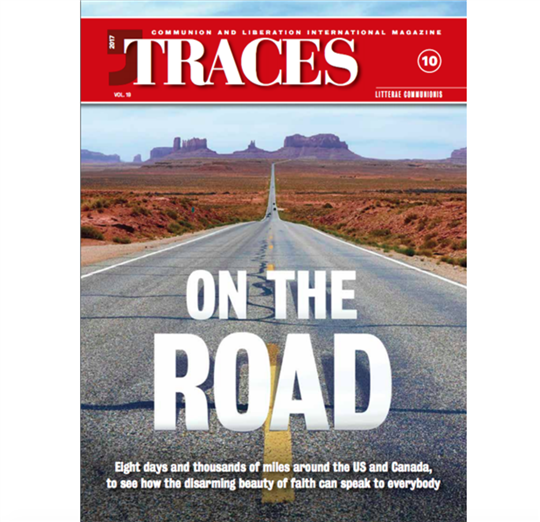
Traces N.10, November 2017
Surprised by BeautyDuring the recent tour presenting Disarming Beauty in the United States and Canada, something happened that is worth looking at. In those seven events in eight days, with three thousand miles of flights, in which many different worlds entered into dialogue with Julián Carrón, the author (and leader of CL), something happened that should not be taken for granted, that even exceeds the surprising beauty contained in certain words you will find in the following pages.
The first fact, an evident one, is that returning to the disarming beauty of faith, to the proposal of a Christianity that has no weapons for winning over people in a way that respects their freedom other than the intrinsic strength of its attractiveness, the power that corresponds to the heart and desire of every person, is something that can interest truly everyone: atheist philosophers and Muslim intellectuals, Jewish sociologists and Baptist filmmakers, and regular folks from any background. This has been seen in many other widely varying contexts (Disarming Beauty has been presented in Italian squares, European universities, and the suburbs of Rio de Janeiro), but it was even more striking in the United States, a country whose nature and history make it a true sampling of all kinds of
humanity.
And still “the heart of the empire,” albeit a weary one. It is surely the reality most similar to the ancient empire, the one of the first Christians, though unlike two thousand years ago, it is a post-Christian empire, a universe that has already known, assimilated, and interpreted Christianity in different forms and ways, to the point of often reducing it to a set of good and just values to be defended even from behind barricades, in a context that is going in an entirely different direction.
Event or doctrine. What is Christianity? Something that happens, and in happening changes people and their way of living, or an ethical ideal to recover by studying, formation, and defending that which remains? In the “Close Up” article, this difference of position emerges as a thin but crucial common thread. Interestingly, those most struck by the proposal of Disarming Beauty are people who at first sight seem to be the furthest from it, while the most resistance is met from those who are already Catholic by history and tradition.
But these positions are not two “interpretive lines of thought.” We are continually set before the crossroads of these alternatives, in every moment. We can look with surprise at the beauty of Christ happening when and how He chooses (in the life of a family in Cameroon or in the other stories you will find in these pages of Traces), letting ourselves be attracted and converted by Him, or we can think deep down that we already know it all, and that we just have to return to explaining it better and then waiting for people to understand. But what does today’s empire need?